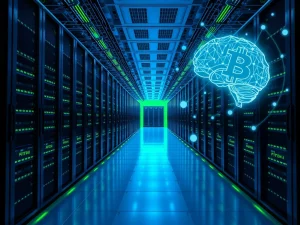Revolutionary AI: Tech Layoffs Surge, But Non-Tech AI Jobs See a Staggering 28% Salary Boost

The digital revolution continues to reshape our world, and at its forefront is Artificial Intelligence (AI). For those immersed in the fast-paced world of cryptocurrency and blockchain, the concept of rapid technological shifts is nothing new. Just as decentralized finance challenges traditional banking, AI is fundamentally altering the global job market. While headlines often focus on the potential for AI to displace workers, a fascinating new report reveals a more nuanced truth: while the tech sector grapples with significant layoffs, non-technical roles embracing AI skills are experiencing a remarkable surge in salaries. This dual impact of AI on jobs is creating both challenges and unprecedented opportunities.
The Paradox of AI Jobs: Tech Contraction vs. Non-Tech Expansion
It might seem counterintuitive, but as AI capabilities expand, the very sector that birthed it—technology—is undergoing a significant workforce contraction. Labor market intelligence firm Lightcast’s recent study, analyzing over a billion job postings, highlights this paradox. Companies are increasingly leveraging AI for automation in areas traditionally handled by human tech workers, leading to substantial tech layoffs. For instance, Microsoft, despite investing billions in AI infrastructure, has announced significant job cuts, signaling a strategic shift towards automation in software engineering, IT support, and administrative functions.
Consider these key findings:
- Declining Tech Demand: AI-related job postings within IT and computer science have decreased from 61% in 2019 to 49% in 2024. This indicates a clear shift as automation takes over more traditional tech responsibilities.
- Automation’s Reach: Roles like software engineering, data entry, and even basic IT support are becoming increasingly susceptible to AI-driven automation.
- Strategic Investments: While companies cut jobs, they simultaneously pour billions into AI infrastructure, indicating a long-term commitment to AI integration, even if it means short-term workforce adjustments.
This isn’t just a cost-cutting measure; it’s a fundamental re-evaluation of how work is done within the tech industry itself. The focus is shifting from manual execution to AI-powered orchestration.
Unlocking Potential: How AI Skills Boost Non-Tech Salaries by 28%
While the tech sector navigates this transformation, a different story is unfolding across non-technical industries. The Lightcast report reveals that non-tech positions requiring AI skills are commanding an average of $18,000 more annually, representing a staggering 28% increase compared to similar roles without AI proficiency. This isn’t merely a niche trend; it’s a widespread phenomenon affecting diverse sectors.
Industries now seeing a significant demand for AI-proficient non-tech workers include:
- Marketing: AI tools are revolutionizing customer segmentation, content creation, and campaign optimization.
- Finance: AI assists with fraud detection, algorithmic trading, and personalized financial advice.
- Education: AI powers personalized learning platforms, automated grading, and administrative efficiencies.
- Customer Service: Generative AI chatbots handle routine inquiries, freeing human agents for complex problem-solving.
- Healthcare: AI aids in diagnostics, drug discovery, and patient management.
The proliferation of generative AI tools like ChatGPT and Microsoft Copilot has fueled an 800% surge in job postings for these specific skills since 2022. This demonstrates a clear market signal: employers are willing to pay a premium for individuals who can effectively leverage these powerful new technologies.
Mastering the New Frontier: What AI Skills Are Most Valued?
It’s no longer enough to just know what AI is; proficiency in specific AI applications is becoming a critical asset. The Lightcast 2025 Artificial Intelligence Index Report highlights that possessing two or more AI skills correlates with a 43% premium on advertised salaries. This indicates that a broader understanding and application of AI tools significantly enhances a candidate’s value.
Some of the fastest-growing and most sought-after AI skills include:
- Large Language Modeling (LLM) Expertise: Understanding how LLMs work, their capabilities, and limitations.
- ChatGPT Proficiency: Practical experience in using and fine-tuning ChatGPT for various tasks.
- Prompt Engineering: The art and science of crafting effective prompts to elicit desired outputs from generative AI models.
- Data Interpretation: The ability to understand and derive insights from AI-generated data.
- AI Tool Integration: Knowing how to seamlessly integrate AI tools into existing workflows and systems.
Beyond these technical competencies, employers are increasingly seeking a ‘hybrid skillset.’ This combines foundational AI knowledge with crucial soft skills such as communication, leadership, and problem-solving. For instance, a sales professional using AI for targeted client interactions needs strong communication skills to close deals, even if AI provided the initial lead. Similarly, customer service roles require not just AI fluency but also empathy and critical thinking to troubleshoot complex issues that AI can’t resolve independently.
Workforce Transformation: The Economic Implications and the Cost of Complacency
The economic implications of this shift are profound and far-reaching. While highly automatable tech roles face potential displacement, millions of non-technical employees are finding new career opportunities or significant wage increases. Cole Napper of Lightcast aptly warns about the “cost to complacency”—those who fail to adapt to AI-driven workflows risk falling behind in an increasingly competitive job market.
This transformation isn’t uniform across all income levels. While higher-paying tech roles might be phased out due to automation, lower-paying positions, particularly those involving repetitive tasks, could see more modest gains or even displacement if the human element isn’t sufficiently valued. The key differentiator will be the ability to collaborate with AI, rather than compete against it.
For organizations, the challenge is clear: AI fluency must be embedded across all departments, not confined to an isolated technical specialty. Companies are investing heavily in upskilling initiatives for marketing teams, HR departments, and finance analysts. This strategic investment aims to build a workforce capable of seamlessly integrating AI tools into core business functions, enhancing efficiency and innovation.
Navigating the Future: Actionable Insights for Employees and Employers
As AI continues its rapid evolution, both individuals and organizations must proactively adapt to this new landscape. The ability to combine AI capabilities with human judgment, creativity, and critical thinking is becoming the ultimate differentiator.
For Employees:
- Embrace Lifelong Learning: Actively seek out courses, certifications, and practical experience in AI tools relevant to your field.
- Develop Hybrid Skills: Focus on strengthening soft skills like critical thinking, emotional intelligence, creativity, and complex problem-solving, which are difficult for AI to replicate.
- Become an AI Collaborator: Learn how to effectively use AI tools to augment your capabilities, not replace them. Think of AI as a powerful assistant.
- Network: Connect with professionals who are successfully integrating AI into their roles to learn best practices and identify opportunities.
For Employers:
- Invest in Upskilling: Prioritize training programs that equip your existing workforce with necessary AI skills across all departments.
- Foster an AI-First Culture: Encourage experimentation and integration of AI tools into daily workflows, moving beyond isolated projects.
- Rethink Job Descriptions: Update job roles to reflect the need for AI proficiency and hybrid skillsets.
- Focus on Human-AI Collaboration: Design workflows that leverage AI for efficiency while maximizing human creativity and judgment.
Conclusion: Thriving in the AI-Powered Workforce
The narrative around AI’s impact on jobs is complex. While it’s true that some roles, particularly in the tech sector, face disruption due to automation, the broader picture reveals immense opportunity for those outside of traditional tech. The significant salary premiums for non-tech roles with AI skills underscore a fundamental shift: AI is no longer just for developers; it’s a universal enhancer for productivity and value across nearly every industry. The future belongs to those who embrace AI as a powerful partner, combining its analytical prowess with uniquely human attributes to drive innovation and secure their place in the evolving global workforce. The time to adapt and learn is now.
Frequently Asked Questions (FAQs)
Q1: Is AI primarily causing job losses, or creating new opportunities?
A1: The Lightcast report indicates a dual impact. While AI is contributing to job cuts in some traditional tech roles due to automation, it is simultaneously creating significant new opportunities and boosting salaries in non-technical sectors that require AI proficiency.
Q2: Which non-technical sectors are seeing the biggest salary increases due to AI skills?
A2: Industries such as marketing, finance, education, customer service, and manufacturing are experiencing a high demand for non-technical professionals with AI skills, leading to substantial salary premiums.
Q3: What specific AI skills are most in demand for non-tech roles?
A3: Highly sought-after skills include large language modeling (LLM) expertise, ChatGPT proficiency, prompt engineering, data interpretation from AI outputs, and the ability to integrate AI tools into existing workflows.
Q4: Why are tech companies laying off employees if they are investing heavily in AI?
A4: Tech companies are prioritizing automation in software engineering, IT support, and administrative functions. Their massive investments in AI infrastructure aim to increase efficiency and productivity through AI-driven processes, leading to a reduced need for human intervention in certain traditional roles.
Q5: What is the ‘hybrid skillset’ and why is it important?
A5: A hybrid skillset combines technical AI knowledge (like prompt engineering) with essential soft skills such as communication, leadership, problem-solving, and critical thinking. This combination is crucial because while AI can perform tasks, human judgment and interpersonal skills are still vital for complex decision-making and effective collaboration.
Q6: What should individuals do to stay competitive in an AI-driven job market?
A6: Individuals should focus on lifelong learning, actively acquiring AI skills relevant to their field, developing strong hybrid skills (combining AI knowledge with soft skills), and learning to effectively collaborate with AI tools to augment their capabilities.









